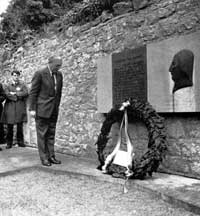22 June 2006 Edition
Haughey: Supporters believed he would lead them to united Ireland
BY Mícheál MacDonncha

Charles Haughey at Fianna Fáil Bodenstown commemoration in 1987
Populist Haughey betrayed the people
The late Charles Haughey experienced two attempts to rehabilitate his political legacy. The first was when he was in government between 1987 and 1989 and the second is now in the wake of his death. History has been revised so that Haughey can be portrayed as a political colossus, a man of the people, a visionary who set up both the Peace Process and the Celtic Tiger. But this is a travesty of the truth.
Haughey, in classic Fianna Fáil style, used populism to great political effect. More than any other Fianna Fáil leader he also used it to enrich himself. He convinced most of his own party and its supporters that he was the leader who truly represented them and the 'plain people of Ireland'. During the Arms Crisis he did not stand with his colleagues Neil Blaney and Kevin Boland who left Jack Lynch's party. Not for the first time Haughey played a double game. He clawed his way back up the ladder inside the Fianna Fáil parliamentary party while playing the republican card with the party's grassroots. By the time he took over the leadership in 1979 many of them believed he was the republican messiah who was going to lead to a united Ireland.
The bile that was poured on Haughey from his political opponents in Fine Gael and the Dublin 4 media undoubtedly helped his image as a republican hawk, a man of guile and cunning, a Northside Dublin gurrier. He exploited this to the full.
The first test of his supposed republicanism was the H-Block crisis and the Hunger Strikes. He failed that test. Haughey had set up talks with Margaret Thatcher that led to very little but which he made much of in his pose as a great statesman. But the most pressing issue of the day was not addressed - the H-Blocks/Armagh prisons crisis. Haughey let the prisoners down and, 25 years ago this month, he paid a political price for it when two prisoner candidates, Paddy Agnew in Louth and Kieran Doherty in Cavan-Monaghan, were elected to Leinster House. This helped to deprive Haughey of power.
Throughout the '80s he tried to play the green card for electoral purposes but did nothing to challenge the Thatcher regime in Ireland. He expressed verbal opposition to the Hillsborough Agreement signed by Thatcher and Garret FitzGerald in 1985. In Government he fully implemented it. In the same period Fianna Fáilers verbalised against political extradition but Haughey extradited political prisoners when he was in office again in 1987. An RAF helicopter took another Northside Dubliner, Dessie Ellis, from Baldonnell Airport to London, extradited by the Haughey government for a political offence.
Little wonder then that the media which had excoriated him soon came around to praise him. He was 'tamed' when he governed with the backing of Fine Gael led by Alan Dukes whose 'Tallaght Strategy' gave conditional Dáil support to the Haughey government provided they stuck to 'fiscal rectitude'. All the talk in the past week about Haughey bringing in free travel and other benefits for the elderly has obscured what his government - and that of Fine Gael/Labour - did to public services in the 1980s. Having fought an election on the slogan 'Health Cuts Hurt the Old, the Sick and the Handicapped' Haughey imposed severe cuts in health and education and social services. The health system has still not recovered from the cuts of that time.
The depth of Haughey's political cynicism and opportunism was demonstrated in his attitude to divorce. Up until the 1990s divorced people in the 26 Counties were denied the right to remarry. This was largely because Haughey's Fianna Fáil opposed removing the ban on divorce in the 1937 Constitution. Had he given a lead in 1986 Haughey could have ensured the success of the referendum in that year. But he preferred to allow it to fail to embarasss his Fine Gael opponents. Meanwhile the man who trumpetted 'family values' was living a lie in his private life.
Haughey was preaching belt-tightening and the need to curb public spending at a time when he was enriching himself courtesy of his super-wealthy, tax-dodging friends in big business. He presided over a tax regime that allowed the wealthy - including himself - to pay little or no tax and salt their money away in foreign bank accounts. These were the people who gathered around the great 'patriot' of Kinsealy.
As for the great Dubliner, Haughey was in power during the worst of the heroin epidemic in his native city. His cuts devastated the low paid and the unemployed he claimed to represent. The golden circle of developers and speculators who thrived under his regime ruined Dublin while making fortunes from corrupt land deals. Working-class people were abandoned in sub-standard estates with few facilities.
Some credit is due to Haughey for his involvement in initial contacts that led to the peace process. But against that must be balanced his continued imposition of political censorship of republicans in the media and his consistent failure to match his green rhetoric with any real challenge to Thatcher's war policy in Ireland.


